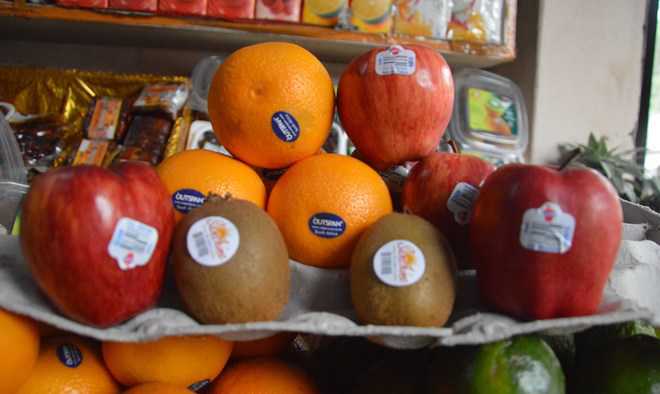Manav Mander
Tribune News Service
Ludhiana, November 12
Do you buy fruits after seeing a sticker pasted on them? Does a sticker on the fruit means to you that it is exotic? If yes, then you are wrong. Stickers pasted on fruits do not necessarily mean that those are imported and exotic.
So, next time you buy a fruit with a sticker pasted on it keep in mind a few things. It has been observed that traders in India use stickers to make their products look premium and, sometimes, also to hide any decay or defect on the product.
Use of stickers on food products to provide information on traceability, grades and price, etc, is a common practice. Apples, kiwis, oranges, mangoes, bananas, pears and bell peppers are some of the fruits and vegetables which have stickers directly applied to their skin.
The stickers of brand name, ‘tested ok’ or ‘best quality’ commonly pasted on fruits are of no significance. Adhesives used on the stickers may contain harmful chemicals. Consumers, who are generally unaware of the residues of these adhesives, consume fruits by simply removing the stickers.
The Food Safety and Standards Authority of India (FSSAI), in its advisory, has advocated that people should wash the fruits properly or peel the skin or cut the area from the fruit where the sticker was pasted.
The advisory further says stickers are used to facilitate traceability and easy accessibility of the information. These stickers contain traceability information and price look-up (PLU) codes. The PLU coding system is voluntary and not made mandatory by any governing body. This type of coding is seen in the supermarkets.
Stickers used by traders do not contain any traceability or other relevant information. Traders generally use stickers to make their product look premium and, sometimes, to hide any defect on the product. These stickers do not provide any quality information.
Shilpa, a resident of Rajguru Nagar, said she was not aware of the fact regarding stickers. “I always thought that fruits with stickers are imported ones,” she said.
Dr Satish Gandhi, a medicine expert, said people should wash fruits properly and it is better to peel off the skin from the area where sticker was pasted. It could contain adhesive residue.
Cut off fruit part under sticker: FSSAI
The Food Safety and Standards Authority of India (FSSAI) says fruits and vegetables with stickers are not necessarily imported or of premium quality. Stickers should be removed before consumption. One must peel off or cut the part where sticker was pasted. Wash the fruits and vegetables properly before consumption.
Avoid putting stickers on skin, traders told
Stickers without any relevance of traceability, grade, price and bar code should not be pasted on fruits and vegetables. Traders should avoid putting stickers directly on the skin of fruits. If stickers are used, then adhesives used should be of good quality which should not cause any ill-effect on human health. A functional barrier, such as cling film, can be used to put stickers, rather than applying these directly on the skin of fruits. The ink used on stickers should be of food grade and it should not affect the food.
Unlock Exclusive Insights with The Tribune Premium
Take your experience further with Premium access.
Thought-provoking Opinions, Expert Analysis, In-depth Insights and other Member Only Benefits
Already a Member? Sign In Now











